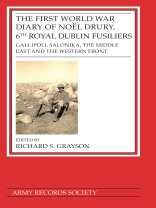The diary of an officer in the 6th Royal Dublin Fusiliers covering 1914-19 and four theatres of war.
Noël Drury (1884-1975) was from a middle-class Dublin Protestant family and served most of the First World War as an officer in the 6th Royal Dublin Fusiliers in the 10th (Irish) Division. The division was the first of Ireland’s wartime volunteer formations to be posted overseas, arriving at Gallipoli in August 1915 in the Suvla Bay landings. Drury and his battalion experienced several key phases of the Gallipoli campaign before being redeployed to Salonika in October 1915. Drury was away from his battalion for a year in 1916-17 suffering from malaria, but rejoined in Palestine towards the end of 1917. From there his battalion was sent to the Western Front in the summer of 1918 to take part in the Hundred Days Offensive. Drury’s diaries describe training, daily life, contrasting theatres of the war, and show what it meant to be an Irish officer in the British army.
Jadual kandungan
List of Illustrations
Acknowledgements
List of Abbreviations
Introduction
1 Volunteering and Training, September 1914-July 1915
2 The Voyage to the Dardanelles, July-August 1915
3 Gallipoli: Landing at Suvla Bay and the Next Ten Days, 7-17 August 1915
4 Gallipoli: Digging In, 18 August-October 1915
5 The Serbian Front and the Battle of Kosturino, October-December 1915
6 The Salonika Front and Hospital, December 1915-September 1917
7 Egypt and Palestine, September-December 1917
8 Defending Jerusalem and the Battle of Tell ‘Asur, December 1917-July 1918
9 France, July-11 November 1918
10 Armistice, 12 November 1918-11 March 1919
Appendices
Biographies
Bibliography
Index
Mengenai Pengarang
Richard S. Grayson, Professor of 20th Century History at Goldsmiths, University of London. He is the author of Belfast Boys: How Unionists and Nationalists Fought and Died Together in the First World War (2009) and Dublin’s Great Wars: The First World War, the Easter Rising and the Irish Revolution (2018).












